
Political terrorism is a deeply ineffective strategy with a high human cost.
Abrahms 2006: in a dataset of 42 terrorist groups, terrorism was rarely successful (7%, 3/42) or partly successful (17%, 7/42); it is more successful against military targets than civilian and with limited goals than maximalist or other goals: mitpressjournals.org/doi/abs/10.116… 

Fortna 2015: relative to civil wars led by nonterrorist rebel groups, terrorist rebel groups were 15x less likely to achieve victory and 2x less likely to reach an agreement with the government: cambridge.org/core/journals/… 

It is difficult to estimate the economic cost of terorrism in particular; the overall cost of fighting violence is about 13% of world GDP, and about 15% of that is spent in fighting internal and external conflicts (such as the Syrian Civil war): economicsandpeace.org/wp-content/upl… 

• • •
Missing some Tweet in this thread? You can try to
force a refresh

















